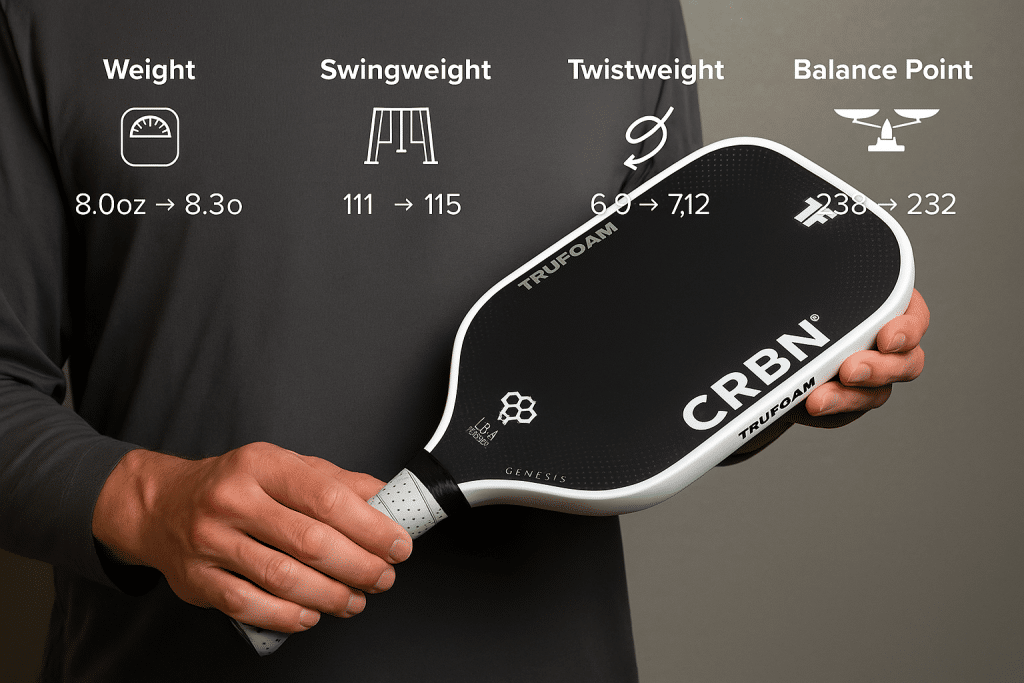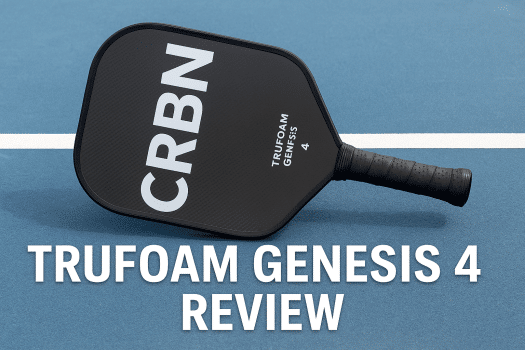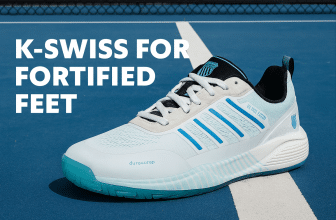Quick Summary (TL;DR)
- Rating: ★★★★☆ (4.5/5 – elite spin and solid power, with a learning curve on touch shots)
- Key Specs:
- Weight: ~8.0 oz average
- Thickness: 14 mm TruFoam Core
- Handle: 5.3″ length, 4.125″ grip
- Measured Spin: ~2300 RPM (high tier)
- Swingweight: 107 (lighter than Genesis 3)
- Playstyle Highlights:
- Great for: aggressive all-court players who love spin and fast hand speed
- Not ideal for: beginners needing max forgiveness or players on a tight budget
CRBN has been leading the charge with carbon-faced paddles for a while now, but the Genesis 4 is their boldest move yet. Foam cores have been a bit of a holy grail in pickleball – plenty of brands have tried them, but most fizzled out under USA Pickleball’s testing standards.
CRBN Genesis 4
That changed with CRBN’s TruFoam series. Genesis 4 is the latest entry, an elongated 14mm paddle designed to balance power, spin, and maneuverability. I tested it for two weeks alongside a couple of playtesters – one at 3.5 and one at 5.0 – to see if the Genesis 4 really lives up to the foam-core hype.
Genesis 4 vs the Competition (2025)
Specs & Design Overview
Key Specifications
- Price: $279.99 (MSRP)
- Weight: ~7.9–8.2 oz (tested sample: 8.0 oz)
- Length × Width: 16.5″ × 7.5″ (elongated shape)
- Thickness: 14 mm TruFoam Core
- Handle Length: 5.3″
- Grip Circumference: 4.125″
- Face Material: Raw T700 carbon fiber with fiberglass activation sheet
- Warranty: 1 year + 30-day trial
Test Results (our lab numbers)
- Swingweight: 107 (lighter than the Genesis 3’s 120+)
- Balance Point: ~238 mm from butt
- Average Spin: ~2300 RPM (93rd percentile across tested paddles)
Design & Build Quality
Out of the box, the Genesis 4 feels premium. The foam core is cut with precise voids that CRBN designed in-house – supposedly after testing 300+ prototypes. The face features raw carbon fiber over a fiberglass sheet, adding both grit and a pop.
The paddle has a clean, minimalist look (CRBN’s trademark). Grip is slim and comfortable, though a bit on the thin side for players with larger hands. Build quality feels excellent – no loose edges or buzzing, and the thermoformed rim should help with long-term durability.
Genesis 4 Play Tester Results
Power & Pop
Genesis 4 delivers respectable power without being a pure “sledgehammer.” Drives and counters had plenty of pace, though not as much raw put-away power as a JOOLA Perseus or Selkirk Power Air. On overheads, it had enough pop to finish points, but won’t overwhelm your opponent with sheer heat.
“I had no problem driving through the ball, but it’s not the most explosive paddle out there. Think controlled power, not raw juice.” – Lleyton Howard (4.5 banger)
Sophia (3.5 player), on the other hand, felt it gave her more free depth on her serves compared to her old paddle.

Spin
This is where the Genesis 4 shines. The surface grip is outstanding – we measured ~2300 RPMs on spin serves, putting it in the top tier.
I found I could roll topspin dinks aggressively, and my drives dipped harder than usual. Lleyton commented, “This might be the spiniest paddle I’ve ever hit. I could hook balls around the post that normally don’t make it.” Even Sophia (who struggles with spin) noticed she was generating spin she couldn’t before, which is a testament to the paddle’s surface tech.
Control & Touch
Here’s the trade-off: touch shots require some adjustment. The foam core feels more connected and solid than a polymer honeycomb, but it’s not quite as plush. I overshot a few third-shot drops early on until I got used to the rebound.
Once dialed in, the Genesis 4 offered solid consistency in the short game, but it’s definitely not the softest-touch paddle on the market. Advanced players will adapt quickly; newer players may find it a bit hot.
Forgiveness & Sweet Spot
The elongated shape means the sweet spot is medium-sized at best. Clean center strikes feel amazing, but mishits near the edges die quickly. Our 3.5 playtester framed a few volleys early on, while the 5.0 tester shrugged it off, saying, “If you hit clean, it rewards you. If not, you’ll know.”
Weighting the head with lead tape at 10 and 2 o’clock expanded the sweet spot noticeably – something I’d recommend for players who want more margin for error.
Maneuverability (Hand Speed)
With its lighter swingweight (107), the Genesis 4 is quick through the air. At the kitchen, I felt confident in hand battles, snapping the paddle into position without sluggishness. The Genesis 3 sometimes felt like swinging a club; the Genesis 4 corrects that.
“I felt like I could finally keep up in fast exchanges without getting jammed.”
Stability & Feel
Despite the quicker swingweight, stability was solid. The foam-filled edges really help minimize twist, and the paddle felt sturdy even when blocking heavy drives.
Feel-wise, it’s denser and more solid than a polymer-core paddle – less hollow, more connected. Our group all agreed it was arm-friendly, with no noticeable vibration issues.
Playtester Feedback
Likes
Advanced Tester (5.0): Called it a “singles weapon” thanks to spin and speed. Loved the control on counter-spins but wished for a slightly bigger sweet spot.
Intermediate Tester (3.5): Gained noticeable spin and serve depth. Took a session to adjust to touch shots, but once she did, she said it “felt like cheating” on dinks.
Author (4.0): For me, the Genesis 4 struck an outstanding balance: not the most forgiving paddle, but incredibly fun for aggressive all-court play.
Comparisons & Alternatives
- Vs Genesis 3: The Genesis 4 swings lighter (107 vs ~120 swingweight), making it quicker in hand battles. The Genesis 3 offers more raw stability but can feel clubby. Both deliver elite spin. If you value speed, go 4; if you want a tankier feel, the 3 still works.
- Vs Honolulu J2NF (foam competitor): Honolulu is slightly cheaper and more forgiving, with a bigger sweet spot. But the Genesis 4 beats it on spin and has a more premium build.
- Vs JOOLA Perseus: Perseus hits harder and has a bigger sweet spot, but the Genesis 4 generates more spin and has a crisper, denser feel.
Who Should Use This Paddle?
- Great Fit For: Aggressive all-court players who thrive on spin, counters, and fast hand battles. Singles players will especially love the spin potential.
- Not Ideal For: Beginners or players who rely on max forgiveness. Also not the best budget buy – at $279, it’s premium priced.
Price & Value
At $279, the Genesis 4 sits in the premium bracket. For the money, you’re getting cutting-edge foam-core tech, elite spin, and a modern all-court feel.
Is it worth it? If you’re a competitive player who can take advantage of the spin and maneuverability, yes. If you’re still working on consistent contact or want maximum forgiveness, you may find better value in mid-tier paddles.
Conclusion & Final Thoughts
The CRBN TruFoam Genesis 4 shows just how far foam cores have come. It’s fast, spinny, and stable – everything you want in a modern aggressive paddle. It’s not perfect (forgiveness could be better, touch requires a learning curve), but it’s one of the most exciting releases of the year.
I’ve rotated it into my bag as my singles paddle, and I don’t see that changing soon. If you’re curious about foam cores, the Genesis 4 is a fantastic place to start.
FAQs
Q: Is the Genesis 4 USAP approved?
Yes – it’s fully approved for tournament play.
Q: How does the foam core feel vs polymer?
Denser and more connected. Less hollow, more solid. Some describe it as “firmer” but also more predictable.
Q: Can I add weight to customize?
Absolutely. With its low swingweight, it’s very lead-tape-friendly. Adding a few grams at 10 and 2 makes the sweet spot more forgiving.
Q: What are good alternatives?
The Honolulu J2NF (foam core, more forgiveness, slightly cheaper) or the JOOLA Perseus (polymer core, more power but less spin).
- OWL Founders Edition Review: The First “Quiet” Paddle You’ll Actually Want to Use - September 18, 2025
- CRBN TruFoam Genesis 4 Review: Foam Core Meets Next-Gen Spin - September 2, 2025
- Foam With a Backbone: Diadem’s Warrior Blue Core Brings Stability and Staying Power to 2025 - August 15, 2025











